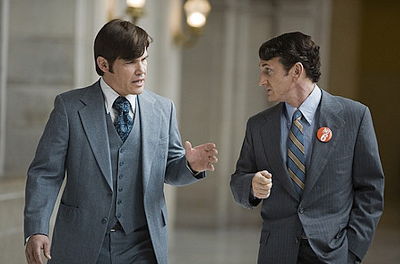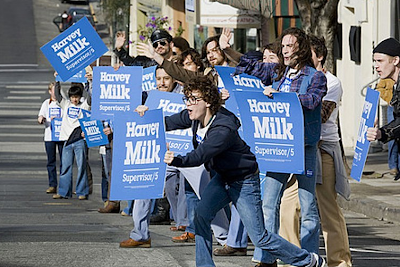| DVD cover artwork for the drama film Wall Street: Money Never Sleeps. |
Financial
Friction by Linh
Wall
Street: Money Never Sleeps, director Oliver Stone’s sequel to his
1987 original hit film Wall Street, matches
the timbre of its predecessor but with a few more textured layers in
characterisation and story plots. The sequel works well as a continuation of
the previous film, yet is able to hold its own as a stand alone film. It is mostly a human drama of love,
deception, lies and vengeance, set against the backdrop of the financial sector
where the almighty dollar is King.
MONEY
MENTOR: Gordon Gekko (Michael Douglas) shares words of wisdom
with Jake Moore (Shia LaBeouf) in the film Wall
Street: Money Never Sleeps. Image: Twentieth Century Fox.
|
The sequel begins eight years after Gordon Gekko (Michael
Douglas) is released from prison in 2001 before it fast forwards to 2008 when Wall
Street is on the brink of financial collapse.
Gekko is seemingly a changed man with a new outlook on money matters and
a self-penned book to promote, when a young investment broker named Jake Moore
(Shia LaBeouf) approaches him to seek advice in bringing down his rival Bretton
James (Josh Brolin), whom he believes is responsible for Jake’s mentor’s (Frank
Langella) death. Gekko’s estranged daughter Winnie (Carey Mulligan) is engaged
to Jake and he agrees to take on Jake as his protégé on the condition he
attempts to reunite him with Winnie. However, both Gekko and Jake have ulterior
motives for the pact.
LOUIS'S
LOSS: Jake (Shia LaBeouf) learns there is a crisis looming at
Louis' (Frank Langella) banking firm in the film Wall Street: Money Never Sleeps. Image: Twentieth Century Fox.
|
Michael Douglas (Solitary
Man, Behind The Candelabra) slips
into his iconic Oscar-winning role of Gordon Gekko with exceptional ease and
shows the idealistic young Jake how the “game” is played in the high stakes
world of Wall Street. The former slick-haired and smooth-talking Gekko returns
as an ageing, philosophical sage whose stint in prison has taught him that
“time is life’s greatest asset”. Gekko attempts to reconcile with his daughter
Winnie through his new protégé, Jake Moore, and manages to exert his influences
on him to seek retribution. Douglas
pulls off the role with unrelenting charm and an inescapable hint that beneath
the reformed and relaxed veneer, there still lurks the “greed-is-good” Gekko of
the past.
Shia LaBeouf (The
Company You Keep, The Necessary Death
of Charlie Countryman) gives an unexpectedly solid and commendable
performance as the young hotshot Jake Moore. Jake rose from humble beginnings
on Long Island to land himself in the fast-paced and frenetic floor of the
stock exchange. He also grabs every opportunity to introduce green energy to
potential financiers, which he calls fusion simulation. Jake becomes suspicious
after his banking firm Keller Zabel Investment, goes under and his boss and
mentor, Louis Zabel, makes “an honourable exit” from the problems of his
beleaguered company. Jake seeks to expose Bretton James for Louis's demise by
befriending him and joining Bretton's company, Churchill Schwartz, to pursue
funding for his green energy project. LaBeouf pumps everything he could into
the innocent-looking but gutsy character Jake Moore, and he exhibits acting
skills that places him amongst the best of Hollywood’s crop of young stars.
GREEN
GENERATION: Jake (Shia LaBeouf) and Winnie (Carey
Mulligan) share a passion for green energy in the film Wall Street: Money Never Sleeps. Image: Twentieth Century Fox.
|
Academy Award nominee and talented British actress Carey
Mulligan (An Education, The Great Gatsby) plays Gekko’s daughter
Winnie, who is a writer and advocate for green energy on a left-wing blogsite
called ‘The Frozen Truth’. Winnie has drifted apart from her father while he
has been in prison and she no longer tolerates his manipulative behaviour. His
re-appearance in her life via Jake stirs up past pains and she suspects Gekko
of sinister intentions. Winnie represents what should be the future of the world’s
investment and legacy for the next generation. She believes money would be
better invested into providing the world with clean, inexpensive and green
energy instead of bankrolled into stocks and shares that may be the next
“bubble to burst”. This is an obvious reference to the debate on global warming
and climate change policies of world leaders which Oliver Stone has cleverly
delivered through the characterisation of Winnie. Mulligan is superb as Winnie,
with an intelligent and sensitive portrayal of a young woman trying to make a
difference in the world.
The antagonist in the film is Josh Brolin (Men in Black 3, Labor Day), as the predatory piranha Bretton James. Bretton's past
deeds have contributed to Gekko's imprisonment and this time, his actions have
caused the collapse of banking institution Keller Zabel Investments. Bretton’s
dastardly deeds and his double-dipping in the shares market lands him in
trouble. Brolin is brilliant as Gekko's former rival and the Gekko-like power
broker whose rumours send the stock markets in a frenzy. Brolin is capable of
epitomising evil with a glint in one eye and a polysemic smirk.
BARRACUDA
BANKERS: Bretton (Josh Brolin) and Jules (Eli Wallach) attempt to
force Keller Zabel Investments into insolvency in the film Wall Street: Money Never Sleeps. Image: Twentieth Century Fox.
|
The supporting cast is excellent and includes Frank
Langella (Robot and Frank, Muppets Most Wanted) as Louis Zabel, the
manager of Keller Zabel Investments–possibly named after Oliver Stone’s father-
and looks smart in a bow tie and trouser braces. Louis is a father figure to
Jake and mentored him in the business of finance and economics, even paying for
Jake's university degree. Langella makes Louis believable as a stalwart who
possesses old-school ways of honesty, trust and integrity in financial matters
that no longer seem pertinent in the current climate of financial wheeling and
dealing.
Susan Sarandon (Robot
and Frank, The Calling) shines in
her scenes as Jake’s mother, Sylvia, who is a nurse turned real estate agent
and experiences the “greed” through sustaining a life beyond her means, and
constantly borrows money from her son to prop up her business. She represents
the everyday people who are stung by the impact of the global financial crisis
when the housing market crashes with many going into foreclosure. Her
appearances in the film are few and her lack of visibility may suggest the
actual “culprits” of the economic downturn are the “game players” on Wall
Street and not the ordinary, low-to-middle income citizens.
Eli Wallach is memorable as the laconic but influential
magnate Jules Steinhardt, who is also the mentor of Bretton James. Jules has
experienced the devastation of the stock market crash in 1929 and knows the
financial markets will not recover without government assistance. Wallach gives
Jules an eccentric quality by improvising the character’s lines to include
whistles.
Cameo appearances throughout the film add some interest
such as Charlie Sheen’s return in one scene as Bud Fox at a charity event and
director Oliver Stone in at least three scenes as an investor. Shameless
product placement is woven into the narrative when Louis buys a pack of Lay’s
potato chips; Jake buys Winnie a Bvlgari
diamond ring; Bretton gives Jake a Ducati motorcycle; Jake presents his
Chinese investors with bottles of Johnnie Walker Blue Label scotch whisky; and
Gordon shouts Jake a bottle of Heineken beer.
CORPORATE
CHICANERY: Jake (Shia LaBeouf), Bretton (Josh Brolin) and Gordon
(Michael Douglas) swap trading tips in the film Wall Street: Money Never Sleeps. Image: Twentieth Century Fox.
|
The film features original songs by former ‘Talking
Heads’ frontman and songwriter David Byrne and Brian Eno, former member of the
rock band ‘Roxy Music’. Byrne and Eno have previously collaborated together on
concert tours and albums and their musical contributions to Wall Street: Money Never Sleeps adds
ambiance to the mood, tone, drama and emotions in various scenes.
Oliver Stone has applied different editing techniques to
this film, even using split screens, fades, iris-in and special effects to
create urgency, panic and confusion as the United States’ banking system goes
into free-fall. In addition to the visual effects, the film’s fictional story
parallels the realistic events of the global financial crisis. The housing
market fiasco resulting in foreclosures and evictions, and the government
bailout of financial institutions are referenced in the film. However, the film
remains a story about people’s lives unravelling as the drama of the global
financial crisis unfolds.
Wall
Street: Money Never Sleeps may not spark another sequel but does
feature great performances, a fabulous soundtrack and a glimpse into the world
of powerbrokers dominating the world of finance on Wall Street. It’s an
entertaining, old-fashioned drama with a subtle message that the value of the
human spirit is worth more than any amount of money.
Director:
Oliver Stone
Writers: Allan
Loeb (screenplay), Stephen Schiff (screenplay), Stanley Weiser
(characterisation), Oliver Stone (characterisation)
Cast:
Michael Douglas, Shia LaBeouf, Josh Brolin, Carey Mulligan, Susan Sarandon, Eli
Wallach, Frank Langella, Austin Pendleton, Vanessa Ferlito, John Buffalo
Mailer, Natalie Morales, Maria Bartiromo, Sylvia Miles, Richard Green, Laura
Dawn, Amber Dixon Brenner, Oliver Stone, Warren Buffett, Charlie Sheen
Producers:
Celia Costas, Alex Young, Alessandro Camon, Edward R. Pressman, Eric Kopeloff,
Oliver Stone
Cinematographer:
Rodrigo Prieto
Original
Music Composer: Craig Armstrong
Film
Editors: Julie Monroe, David Brenner
Production:
Kristi Zea (Production Designer), Paul D. Kelly (Art Direction), Diane Lederman
(Set Decorator)
Costume
Designer: Ellen Mirojnick
Running
Time: 2 hours and 10 minutes







